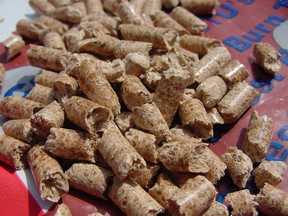The Drax Group is looking to boost security of supply for its own power plant and sales to drive a growing market for biomass power, which is still credited as renewable energy.

.
UK-based energy producer Drax Group Plc is increasing its stake in British Columbia’s wood pellet industry with an agreement to buy its eighth production facility in the province.
Announcement 2
.
The company said this week it will buy Princeton Standard Pellet Corp. and, if it goes ahead, will add 90,000 tonnes/year of capacity to its existing 1.57m t/y production capacity in BC.
That will bring its total to 78 percent of BC’s total capacity, according to industry figures from the Wood Pellet Association of Canada.
And it helps position Drax favorably in the global market for pellets, the fuel for biomass power production, which is credited as renewable energy on the theory that reforestation offsets emissions from its boilers, the consultant said. of the Russ Taylor industry.
“It’s not a growth business, that’s for sure,” Taylor said in BC, because declining lumber harvests that have caused sawmill and pulp mill closures leave less sawmill waste for pellet producers to use.
Announcement 3
.
“But it certainly is a growing sector around the world and more countries are investing in biomass energy production,” Taylor said.
In his press release, Drax CEO Will Gardiner said the acquisition will help the company “build our global pellet production and sales business” both to secure supplies for its own power plant in the North from England, which has converted from burning coal to biomass, and fueling a growing market in Asia and Europe.
Drax last acquired its largest stake in BC by buying the dominant producer, Pinnacle Renewable Energy, which owned and operated plants in Armstrong, Burns Lake, Strathnaver and Williams Lake and had partial interests in plants in Houston, Smithers and Lavington.
Drax’s goal is to amass eight million tonnes of annual pellet production by 2030. Company documents indicate its capacity is up to five million tonnes now.
Announcement 4
.
Taylor said that Japan and South Korea have become the main buyers of BC wood chips, although the UK is not far behind.
And the US South has been more attractive and “tThat’s where Drax’s real growth has been,” Taylor said.
However, the amount of BC production that Drax amassed brought a complaint from the Canadian Center for Policy Alternatives in February that it had too much of a monopoly on wood pellet production in BC.
He called on the Canadian Competition Bureau to intervene after Drax bought sales contracts from another producer, Pacific Bioenergy in Prince George. Days later, that company announced that it would close that plant.
That cost the Public and Private Workers of Canada union 55 jobs, and gave Drax a “strike stranglehold on British Columbia’s wood pellet industry,” union president Gary Fiege said.
ad 5
.
The Center for Policy Alternatives also argued that there was evidence that provincial forest licenses were giving Drax plants too much latitude to take whole sawn logs to grind into pellets.
However, although bioenergy is theoretically renewable, its use on the scale at which it is being used to replace coal in energy production in Europe and Asia worries some.
“At the end of the day, a carbon molecule is a carbon molecule,” said climatologist Werner Kurz. “One of the problems with using wood for bioenergy is that the carbon is quickly released into the atmosphere.”
Kurz said it’s best to maximize the amount of long-lasting products that can be made from wood, such as engineered wood products, which sequester carbon for longer periods, and only use wood waste or logging from logging sites to produce pellets. of wood.
ad 6
.
In that perspective, biomass harvesting has a role in helping to reduce forests at high risk of wildfire, said Kurz, lead scientist on the carbon and wildfire research project being conducted by the Pacific Institute for Climate Solutions. .
So it would be more ideal if that biomass fuel could be used locally to power remote communities that are now powered by diesel-generated electricity instead of being sent to power plants around the world.
“If we were to start scaling this up to the point where we divert wood that would otherwise have gone to sawmills or we had to increase harvest rates (to meet contracts), that would be a very different situation and a less desirable outcome. , ”Kurz said.

